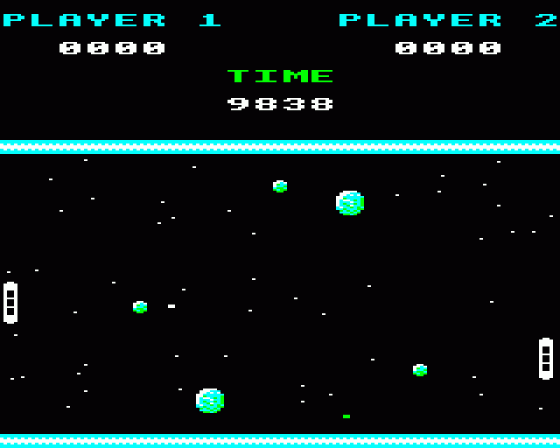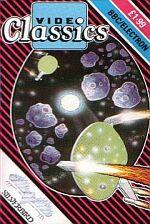
EUG PD
 1st April 2001
1st April 2001
Categories: Review: Software
Author: Dave E
Publisher: Silverbird
Machine: BBC/Electron
Published in EUG #57
Video Classics is a compendium of bat and ball games: updates of the incredibly dated "Tennis" game that appeared on retro consoles - often the size of small houses. On this, you controlled an elongated 'bar', moveable up and down horizontally only at your extreme left or right of the screen. Player two, or the computer, did likewise. Almost the entire rest of the screen consisted of empty space over which a ball (the "o" character) bounced back and forth, ricocheting each time it made contact with the top or bottom of the screen or any player's bar. Objective: to get said "o" to make contact with the outer edge behind the bar of the opposite player.
The inlay of Video Classics tells us people used to love this game, which it affectionately refers to as 'Blip' (after the one sound that was made on contact). "Players would sit in front of it for hours on end" apparently and, if you don't believe this, you probably also won't believe "it's now 1988 and time to enjoy those days once more". But is this title a catalyst anyway? Will it send us back to those glory days?
Well, not quite. As you might expect, although this Acorn Electron title was released on a budget label, it didn't have the gall to recreate 'Blip' as a mishmash of "o" and CHR$255 bar definitions. What it's done instead is remake the game, giving it nice colourful graphics and a range of options for different game-types. The bars have become rounded at the ends (allowing for the ball to spin off at more fitting angles), the animation of the ball (which now looks less like an "o") has become smooth, the backgrounds have become less, um, black and white and the players have been given more control over their bats. Depending upon the type of game they choose to play, they're given more bats too!

After loading and a quickish display of the word Blip!, whether to opt for standard 'Tennis' or one of the other options can be chosen from a Mode 5 multi-coloured menu. A single player can also choose to play the machine. So, if the format was half as popular as Silverbird suggest, you might think they'd got a real winner here: all the elements of the original maintained and improved plus a bucketful of new ideas: Squash, Four Bat Blip and Astrobliperoids being just three of them.
Yet, though there's no quibbling with this, or with the presentation (although what all those European flag logos are doing on the inlay is anyone's guess!), the game shares a huge flaw with its original counterpart: the real player always wins when playing against the computer!
The 'blip' bore works like this. Select one player, and select a game to play. The computer will serve and you will move into a position where you can deflect the ball to avoid the computer gaining a point. Back the ball will bounce. The computer will mirror the ball's movements, often in perfect synchronisation with it so it always manages to get it squarely in the centre of its bat. There'll be a blip and the ball will head back your way. Because it always hits the computer's bat in the same place (squarely in the centre), it will always come toward you at the same angle, making it unbelievably easy to see in advance where your bat needs to be to deflect it!

Theoretically, if the 'game' carried on like this, it would go on forever and a day - and your computer would be quite happy if this were the case. In an attempt to liven things up however, the real player is likely to try and hit the ball with the edge of his bat, hopefully to send it spiraling off near an angle close to 90 degrees at a speed that the computer cannot match. Whereupon, the real player 'wins'. If this sounds boring via text, then you don't know the half of it if you're actually at the keyboard! Knowing that, provided you hit the ball in a certain way, you're assured of success fair destroys any playability!
Of course, the solution to this is simple. Forget about the one player option and drag your friend to the keyboard! The game then does become just as addictive and playable as Silverbird imply and, with the added key movements of left and right (within a small area on 'your' side of the screen) you can broach the ball in many different ways in order to take your opponent off-guard, whilst he, of course, will be trying the same Tactics on you! This is what the one-player program code should take account of - emulating a living, thinking and scheming player, not contenting itself to mirror the ball's horizontal movement!
Which of the extra games (all are loaded at the same time and stored in RAM becoming active when you select them) do it for you will differ. The much publicised Astrobliperoids is actually much more frustrating than playable: here the area between the two bats is filled with numerous floating spheres, rising and falling horizontally from the top to the bottom of the screen. Contact sends the ball off at all sorts of mad angles, frequently resulting in cries of (your) disbelief!

Squash is quite a playable alternative: the ball must be bounced off three walls between being touched by each bat in turn (they can pass through one another which is helpful here!). Four Bat Blip and many of the others only really work if you're prepared to acquire the skills associated with their unique gameplay.
The actual format of the Video Classics tape is, like other Silverbird releases, a fully protected one with a customised loader and baud rate hence the game cannot be transferred to disk (tape-to-disk utilities can't recognise the continuous data stream). This is a minor niggle - only really pertinent to those who don't have a tape recorder permanently connected to their BBC or Electron.
The conclusion is that, notwithstanding the futilitity of the one player option, Video Classics is a good gaming experience for two. The only new title which appeared on the Silverbird budget range for the BBC machines, [The other three titles were re-releases - Ed] apart from including realistic computer intelligence, even a modern release would be hard-pushed to better the variations of this old favourite it presents.











